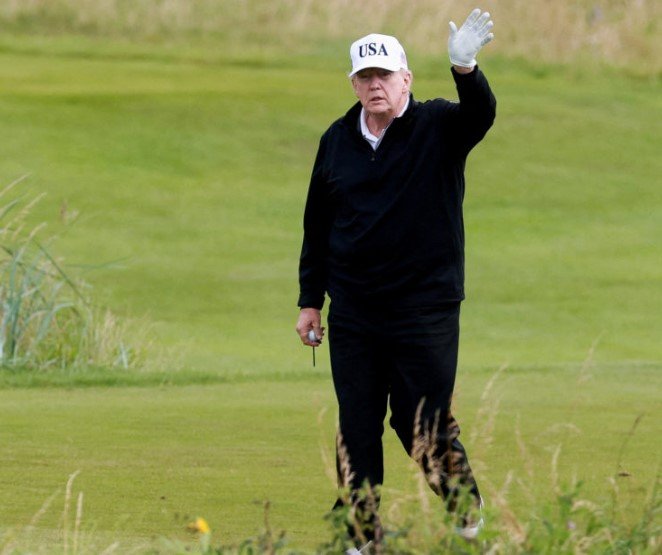Netanyahu pushes back, blaming Hamas for aid theft; Trump expresses dismay over Gaza images and U.S. humanitarian spending
During a visit to Scotland on Sunday, U.S. President Donald Trump issued his most pointed remarks yet on the humanitarian catastrophe unfolding in Gaza, saying Israel “will have to make a decision” as graphic images of starvation and suffering continue to emerge.
Speaking from his Turnberry golf course alongside European Commission President Ursula von der Leyen, Trump was asked by a reporter about images of emaciated children in northern Gaza that have been widely circulated in recent weeks. His response was blunt: “They’re terrible. Just terrible.”
But in characteristic fashion, Trump quickly pivoted—suggesting, without naming names, that the aid reaching Gaza is being intercepted. “They’re stealing the food,” he said, a likely reference to Hamas, which Israeli officials have repeatedly accused of diverting supplies meant for civilians.
U.S. Spending, No Shared Burden
The president also took a swipe at other countries, claiming the U.S. had contributed $60 million to the Gaza Humanitarian Foundation while “no other country gave anything.”
Trump’s criticism wasn’t limited to the aid bottlenecks. It extended to what he sees as lopsided international involvement. “It makes you feel a little bad when you do that and, you know, you have other countries not giving anything,” he added, shaking his head.

The Gaza Humanitarian Foundation—established earlier this year to centralize aid logistics in the Strip—has come under increasing scrutiny from both Israeli officials and U.S. lawmakers for lack of transparency and alleged infiltration by Hamas operatives.
Short sentence here: Trump didn’t offer specifics on the allegations but hinted he wanted answers.
Netanyahu Responds: ‘There Would Be No Gazans’
Back in Jerusalem, Israeli Prime Minister Benjamin Netanyahu was quick to respond to Trump’s remarks. In a late-night televised address, Netanyahu denied any Israeli role in Gaza’s food and medicine shortages.
“We have allowed the entry of aid from the beginning of this war,” he said. “If we hadn’t, there would be no Gazans left.”
The prime minister doubled down on his long-standing accusation: Hamas has looted aid convoys, stockpiled food for fighters, and then turned the cameras on starving civilians to blame Israel.
“The cruelty is staggering. They hide behind their people, steal from their people, and then lie to the world,” Netanyahu said.
One sentence paragraph: He made no mention of Trump by name.
War Drags On, Aid Still Stuck
Since the war began on October 7, aid access has been one of the most bitterly contested issues. The Israeli military claims it has opened crossings and coordinated with international partners to facilitate truckloads of food and medical supplies.
But UN officials and aid groups have painted a grimmer picture—saying trucks are often delayed, denied access, or attacked by mobs, including looters believed to be part of organized gangs or local Hamas affiliates.
According to the UN Office for the Coordination of Humanitarian Affairs (OCHA), just 36% of requested aid shipments reached their destination in northern Gaza in the past 30 days.
That’s an improvement from the bleak 12% in late May, but still far from sufficient.
• As of July 25, over 30% of Gaza’s children under five are experiencing acute malnutrition
• At least 41 aid workers have died since October, according to the Red Crescent
• Medical supplies remain stuck in Egyptian warehouses near Rafah due to ongoing border closures
Trump’s Shifting Gaza Tone
For months, Trump has tried to strike a careful balance on Israel’s military campaign in Gaza—defending its right to retaliate against Hamas while expressing concern over the war’s optics and human toll.
Sunday’s remarks, however, signaled a subtle shift. They weren’t framed as praise or blame. Instead, they sounded like frustration.
“They’ll have to make a decision,” he repeated, alluding to Israel’s long-term presence in Gaza without specifying whether he meant a ceasefire, troop withdrawal, or political move.
He didn’t elaborate.
Trump’s critics have seized on his vagueness, arguing it reflects an absence of clear policy. His allies, meanwhile, say it gives Israel room to maneuver while pressure from the U.S. public—and international watchdogs—intensifies.
War Fatigue in Washington
Inside the Beltway, even some of Trump’s staunchest pro-Israel backers are showing signs of fatigue.
House Majority Leader Steve Scalise said Friday that continued humanitarian spending would require stricter oversight. Senate Foreign Relations Committee Chair Jim Risch (R-ID) has also hinted that bipartisan support for blank-check aid is waning.
One lawmaker, speaking anonymously, told Axios: “We’re sending money and getting images of starving kids in return. That’s a hard sell to the folks back home.”
Meanwhile, a leaked draft from the State Department this week acknowledged that aid blockages—not just Hamas theft—have played a role in the worsening crisis.
Short sentence: No one wants to say it aloud, but the U.S. is increasingly implicated.
Will Israel Shift Course?
Trump’s comments may have been offhand, but they carry weight—especially for Netanyahu, whose personal rapport with Trump stretches back years.
In Israeli political circles, Trump’s phrase “make a decision” is being parsed in real time. Does it signal a policy pivot if he returns to the White House in January? Could it be a warning that even close allies have limits?
Israeli columnist Ben Caspit put it this way Monday morning: “When Trump talks, Netanyahu listens. That’s always been true.”
But with domestic pressure mounting—over hostages still held in Gaza, economic fallout from the war, and growing friction with the Biden administration—it’s unclear how long Netanyahu can maintain the current course.
